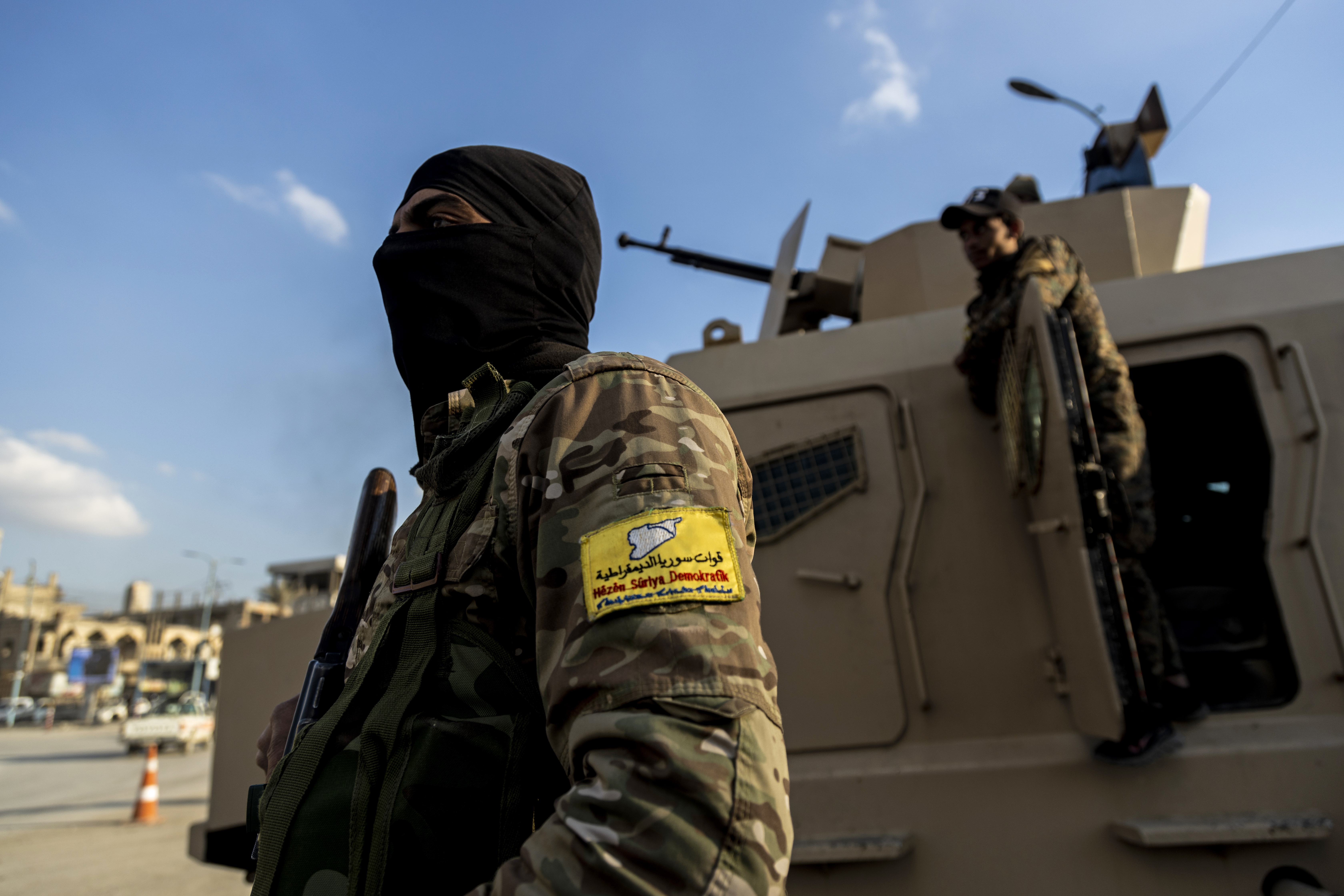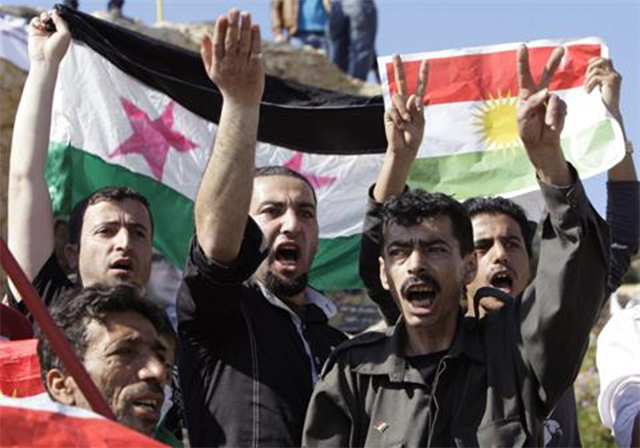
Published November 11, 2025
The Shock Announcement
In early November 2025, the world witnessed a diplomatic earthquake: Ahmed al‑Sharaa—better known until recently by his nom de guerre Abu Muhammad al‑Julani—the former commander of the al-Qaeda-linked group Hay’at Tahrir al‑Sham (HTS), was officially hosted at the White House by Donald Trump.
What made the meeting even more startling for many observers—especially for Kurdish groups in Syria and the region—was that this was the first time a Syrian leader had visited the White House since Syria’s independence.
Who is Ahmed al-Sharaa (formerly al-Julani)?


-
Born in 1982, Ahmed al-Sharaa (aka al-Julani) rose to prominence as the leader of HTS, which emerged from the former Jabhat al‑Nusra, an al-Qaeda affiliate in Syria. Wikipedia+1
-
Over the years, HTS built governance structures, collected taxes, and operated in parts of Syria’s Idlib governorate—blurring the lines between militant group and de-facto civilian authority. Wikipedia
-
In late 2024, HTS and allied forces succeeded in toppling the long-time regime of Bashar al‑Assad, which opened the door to al-Sharaa’s rise as Syria’s transitional leader and then president. Wikipedia+1
What Happened at the White House?
-
Al-Sharaa visited the White House around November 10, 2025, for a roughly two-hour closed-door session with President Trump. AP News+1
-
The meeting coincided with a major U.S. policy shift: Washington announced that Syria would join the U.S.-led coalition against Islamic State (ISIS), becoming its 90th member. AP News+1
-
It also came amid waivers/new relief regarding longstanding U.S. sanctions on Syria under the Caesar Act, reflecting a broader reopening of U.S.-Syria relations. Morocco World News+1
Why the Kurds Are Particularly Alarmed
For Kurdish communities—especially those in northern Syria and nearby regions—the meeting raised multiple red flags:
-
Marginalisation risk: Kurdish-led forces (such as Syrian Democratic Forces (SDF)) have long sought guarantees for autonomy, rights, and protection. The U.S. pivot toward Damascus (via al-Sharaa) may signal prioritisation of regime reintegration over Kurdish security demands.
-
Historical pact concerns: Earlier deals between the Syrian regime and Kurdish forces called for integration of the SDF into the national army, but implementation has been uncertain. The White House move gives the regime renewed leverage to dictate the terms.
-
Justice and accountability fears: Many Kurds remember the regime’s crackdown in regions like Afrin and have raised concerns that a regime-friendly al-Sharaa might not pursue meaningful accountability for past abuses.
-
Trust deficit with the U.S.: Kurdish groups recall instances of U.S. withdrawing support or changing alliances. A White House invitation to a figure previously listed as a terrorist leads to feelings of betrayal, or at least severe distrust.
Geopolitical Stakes at Play
Oil, reconstruction and foreign interests
The U.S. move is not only about counter-terrorism. Syria has substantial oil and gas resources, and a re-engaged Damascus offers economic opportunities for Western and regional players. Morocco World News
Regional realignments
The meeting may be part of a broader strategy: re-norming relations between the U.S., Russia, Turkey, Syria and Israel. For the Kurds, this could mean being sidelined as major players negotiate over their territory and role.
Terror-to-diplomacy shift
Al-Sharaa’s transformation—from an insurgent leader with a U.S. bounty reportedly placed on him to a state interlocutor—marks a paradigm shift. The question now: can he shed his militant past credibly, and will his new alliances leave the Kurds secure? Morocco World News
What It Means for the Kurdish Cause
-
Negotiation leverage weakened: Kurdish groups lose some of the bargaining power they had when the U.S. was their key backer.
-
Security vacuum potential: If the U.S. pivots away, Kurdish regions may face renewed threats from regime forces, Turkish incursions, or jihadist groups.
-
Need for new alliances: Kurds may need to recalibrate diplomatically—looking to Europe, broader civil society, or even engage anew with the Syrian regime for protections.
-
Narrative challenge: The invitation of al-Sharaa sends a message: former militant leaders can be rehabilitated if useful geopolitically. This may hurt Kurdish efforts to press for accountability and rights when the same actors are now in power.
 Implications
Implications
The White House meeting between U.S. President Donald Trump and former al-Qaeda commander-turned-Syrian leader Ahmed al-Sharaa (al-Julani) carries deep and far-reaching implications, particularly for the Kurds, the Middle East balance of power, and global diplomacy.
1. A New U.S. Doctrine: Realpolitik Over Reputation
The United States’ decision to host a man once labeled a terrorist marks a stark departure from its traditional policy of refusing engagement with former extremist leaders.
This sets a new precedent in U.S. foreign policy—prioritizing strategic stability, counterterrorism cooperation, and oil interests over past ideological alignments.
It sends a signal: if a former militant can secure power and appear “reformed,” Washington may be open to dialogue.
2. Kurdish Trust in the U.S. Severely Undermined
For Kurdish leaders and communities who fought alongside the U.S. against ISIS, the optics are devastating.
The meeting reinforces a long-standing Kurdish fear—that Washington will trade Kurdish autonomy and security for broader regional deals.
If al-Sharaa’s regime consolidates control with U.S. blessing, Kurdish self-rule in northern Syria may erode, and their previous sacrifices could be overshadowed by new geopolitical priorities.
3. Regional Realignment and Turkish Leverage
Turkey, which has long opposed both Kurdish autonomy and HTS, gains renewed influence.
An American rapprochement with Damascus may encourage U.S.–Turkey coordination on containing Kurdish forces near the border.
This could pave the way for joint U.S.–Turkey operations under a “counterterrorism” banner—ironically against the same Kurdish groups that helped defeat ISIS.
4. Legitimizing “Rebranded” Extremist Leaders
Al-Sharaa’s White House appearance legitimizes the “rebranding” strategy of militant leaders seeking international recognition.
This may embolden similar figures elsewhere—from Libya to Yemen—to reshape their image and pursue power under a nationalist or anti-terrorism guise.
The risk: a global normalization of ex-jihadist politics in exchange for short-term diplomatic gains.
5. Moral and Legal Questions for U.S. Policy
Hosting a man once affiliated with al-Qaeda raises questions about accountability for past crimes, including civilian targeting and human rights abuses.
If Washington can lift sanctions and extend diplomatic courtesies to such a figure, the moral consistency of U.S. foreign policy comes under scrutiny.
This could undermine the credibility of future American condemnations of terrorism or authoritarianism.
6. Syrian Regime’s Return to the Global Stage
The event also accelerates Syria’s re-entry into the international system after years of isolation.
It opens doors to foreign investments, reconstruction funding, and possible reintegration into the Arab League’s Western-aligned bloc—shifting power away from Iran and Russia.
However, this could come at the expense of Kurdish autonomy, as Damascus consolidates its authority.
7. Strategic Opportunity for Russia and Iran
Although sidelined in this specific meeting, both Moscow and Tehran stand to capitalize on U.S. contradictions.
By presenting themselves as more consistent allies to local partners, they may deepen influence in northern and eastern Syria.
A weakened Kurdish-U.S. alliance benefits these regional powers, who have long sought to curb American sway.
8. Future of Kurdish Self-Governance at Risk
Without strong U.S. backing, the Kurdish-led Autonomous Administration of North and East Syria (AANES) may face increasing pressure to submit to Damascus.
Integration of the SDF into the Syrian army—if forced—would effectively end Kurdish military independence.
The dream of a pluralistic, self-governing Kurdish region could fade under the shadow of a centralizing Syrian state.
9. Global Symbolism: The Normalization of Once-Untouchables
Finally, this event symbolizes a global political trend—where the West increasingly prioritizes order, oil, and stability over past moral judgments.
For many observers, it evokes a troubling message: “yesterday’s enemy can become today’s guest of honor”—depending on who controls the territory and the narrative.
 Overall Takeaway:
Overall Takeaway:
SOURCES: THE GATEWAY PUNDIT – Exclusive: Kurds Stunned as Former al-Qaeda Commander al-Julani Hosted at the White House
PBS – Al-Sharaa meets with Trump at White House as Syria seeks closer ties with the West
MOROCCO NEWS – A Rundown of Al Sharaa’s First White House Meeting with Trump: Kurds, Oil, and Israel








Be the first to comment